Last week, we read about Keith Alan Deutsch’s attempt to revive Black Mask in 1974. That failed after one issue. The 1985 revival, as an anthology book, was much better. Let’s find out how that happened.
The Unusual Suspects
Bear with me while I make the introductions. I promise they’ll connect later.
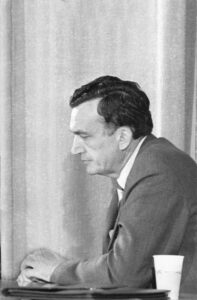
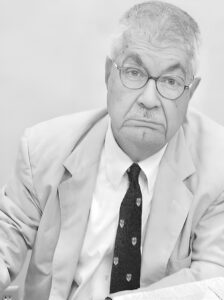

William I. Jovanovich(1920-2001) was a personification of the American dream. Born in 1920 in a Colorado coal-mining camp to a Serbian father and a Polish mother, both of whom immigrated to work in steel mills, William entered school knowing Serbian and no English. He put himself through college with a variety of jobs, graduating from the University of Colorado and followed it up with a post-graduate fellowship at Harvard. His studies were interrupted by World War 2, when he joined the US Navy and served for four years.
When he resumed his studies in 1945, he found himself at Columbia University, doing a thesis on Ralph Waldo Emerson. To provide for his family, he took a job in 1946, selling textbooks at Harcourt, Brace and Co for fifty dollars a week. In eight years, he became president of the company and stayed in the job for thirty-five years. When he started, the company had 125 employees and 8 million dollars in sales. At his retirement in 1988, the company had his name, employed 12,500 employees and annual sales of 1.7 billion dollars.
Matthew J. Bruccoli was born in New York in 1931; he earned his bachelor’s degree at Yale and his masters and doctorate at the University of Virginia. He worked at the University of South Carolina, where he published works on authors including Hemingway, John O’Hara and Thomas Wolfe. But he was best known for his scholarship on F. Scott Fitzgerald, about whom he authored more than twenty books. He was also interested in hardboiled American fiction, and unlike many academics, willing to admit it in writing. He authored works on Ross Macdonald, Raymond Chandler, Dashiell Hammett, George V. Higgins, some with Richard Layman, who was his graduate assistant. Bruccoli was a friend of William Jovanovich, whose firm published many of his books.
Richard Layman attended the University of South Carolina, where he received his Ph.D. in 1975. He’s an expert on Dashiell Hammett, having written nine books on him, including a bibliography; a full-length biography; and edited his Selected Letters. Layman’s books have been nominated for the Mystery Writers of America Edgar Award, twice. He has also edited Gale’s Dictionary of Literary Biography series for a long time.
John Boynton, editor of the Harvest/HBJ line, said that the inspiration for The New Black Mask came straight from HBJ Board Chairman William Jovanovich.
“It came out of a conversation he had with a local book editor in San Diego,” said Boynton. “The idea basically was that there was a mystery boom going on, but there was no place to showcase short mystery fiction, nor was there any place that the best of the old pulps could be brought back.
“What we wanted to do was fill a niche for mystery readers who wanted to know something more about the genre. There’s a lot of previously unpublished or limited circulation material that would be of high interest to a mystery buff. This gives people the chance to see it.”
It was natural that when Jovanovich wanted someone to edit the series, he’d turn to his friend Bruccoli who was an expert on the subject. And Bruccoli on his part turned to Richard Layman. Together, they put together…
An attractive book
…that managed to capture the spirit of Black Mask without being a slavish imitation or a reprint anthology. Issued in trade paperback size, each issue has painted covers by Irving Freeman, and 250 odd pages with no illustrations.
A good mix of reprints and new stories in each issue. It featured prominent authors including Ed McBain, John D. MacDonald, Sara Paretsky, Tony Hillerman, James Ellroy, George V. Higgins, Loren D. Estleman and Donald Westlake among others. Each issue also featured an interview with an author who had a story in the issue.
Let’s look inside one issue. I picked the third one.
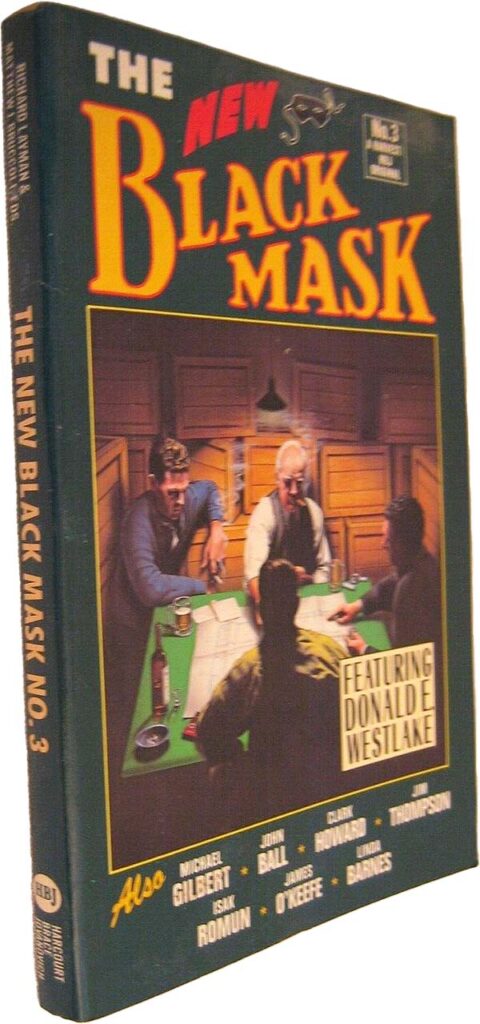
Story time
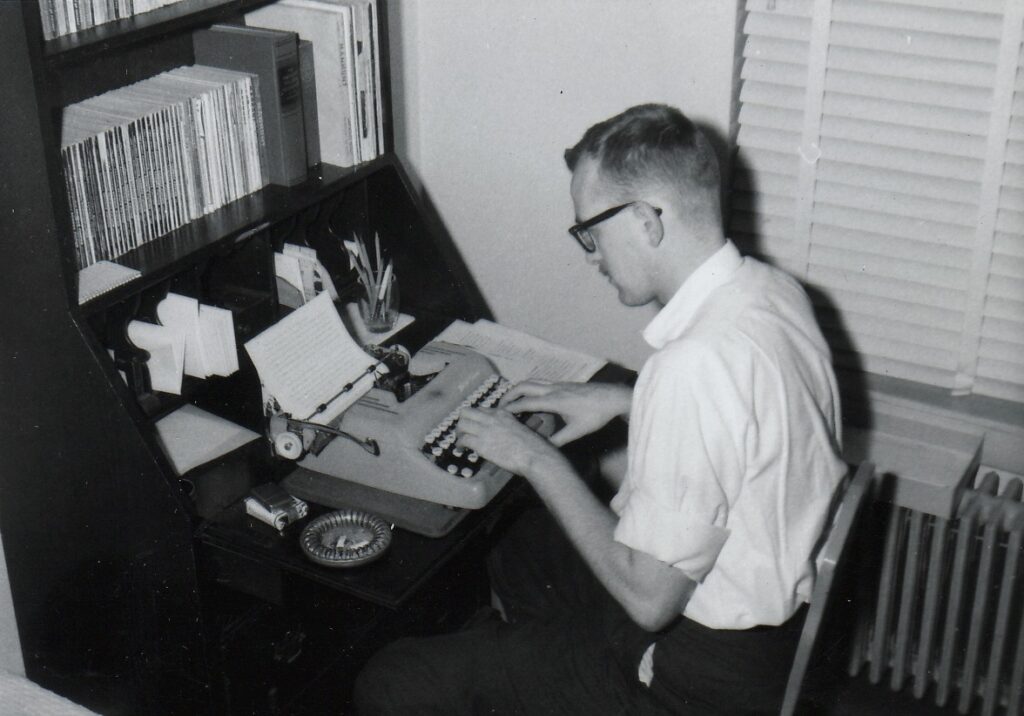
Westlake’s interview is priceless. He doesn’t pull a single punch, whether he’s talking about Hollywood, contemporary publishing or television. By the end of the interview, I imagine the interviewer was wondering if he could actually print this stuff. Here’s a quote that might give you the flavor of the thing:
Westlake: I’ve done a whole bunch of things for television. Luckily, almost none of it has been on the air.
NBM: Why do you say “luckily”?
Westlake: Television is much worse than movies.
The story is an excerpt from a Dortmunder novel. Good Behavior is one of Westlake’s better Dortmunder outings. I won’t review the novel because others have done a better job. The excerpt in this issue, though, I can give a flavor of.
“Nun shall pass” is the attitude of the sisters in the convent that Dortmunder, unlucky thief, drops into. Quite literally, as he falls through the roof while escaping from curious cops. Dortmunder is thinking about crime and punishment when the nuns rescue him, but it turns out they’re a merciful order. They need a man with Dortmunder’s skillset, and chance has dropped him in their laps. They tell Dortmunder that they need him to rescue a nun who’s been kidnapped by her rich father and held under guard in a high tower skyscraper. Westlake is mordantly funny and satirical. Read the book.
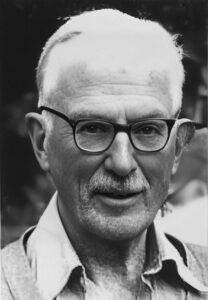
Michael Gilbert’s A pity about the girl is unexpectedly and excellently hardboiled. Michael Gilbert’s dry, observant writing contrasts well with the protagonist’s emotional rollercoaster ride. Recently widowed ex-soldier Siward is on vacation in France, musing on whether he will ever form a deep emotional connection with another woman. He runs into a comrade from World War 2, who is accompanied by his beautiful daughter. They invite him home, he spends five delightful days there before heading back. When he’s asked to let the daughter accompany him on his trip home, he immediately agrees.
But there are deep currents here. The comrade is an accomplice of a drug smuggler, the daughter is an unwilling tool of her father, and they are being chased by the smuggler’s gang, who have discovered that Siward is a member of the narcotics control department in the British police. As they come closer to him, he has to choose who will die and how. Understated ending. Gilbert is one of my favorites; start with his Calder and Behrens spy stories if you haven’t read him.
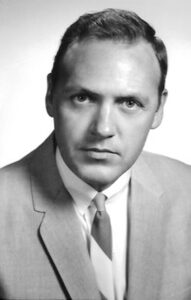
Clark Howard’s name might sound unfamiliar; he was a regular in Alfred Hitchcock’s and Ellery Queen’s Mystery Magazines from the 1960s to the 1990s. And published nearly two dozen books in that time. Break Even doesn’t quite work for me, stretching plausibility a bit further than I could take. Still, there’s nothing really wrong with the story and it has a hardboiled ending, sort of.
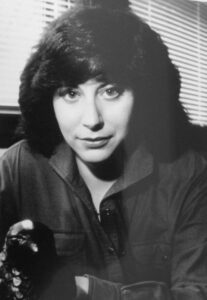
Lucky Penny was Linda Barnes’ first story of Carlotta Carlyle, a six foot one ex-policewoman turned PI. It’s the first story by a woman author in the magazine. A robber takes money from a cabby at gunpoint, keeps the change and dumps the cash. Why wouldn’t the robber keep the cash? It’s untraceable. The interplay between rookie Carlotta and gruff mentor Mooney is fun, but nothing special. I guess it must have improved as time went on because she wrote more than a dozen books in the series.
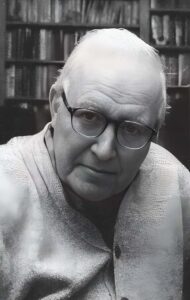
Gordon Bennett writing as Isak Romun gives us The Grabber, a dark tale where there’s no conclusive happy ending for anyone. Like life itself. A teen is assaulted by a serial rapist, beaten till she’s near death. Her boyfriend is unconscious and there are no other witnesses. The rapist is found much later and shot; he leaves the three digits 6 6 6 marked on the wall. Sounds like a resolution, right? Not really; the abyss of darkness is much deeper. A tad overwritten in patches, and might not have made it into the original Black Mask, but a good story for all that.
Death makes a comeback by James O’Keefe is the author’s first published story. A father-son cop team unmask a serial killer who makes a comeback after seven years. With help from the son’s therapist, who does a bit of psychological profiling. Ok.
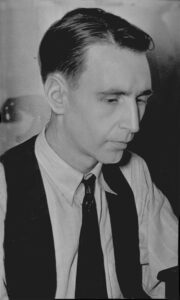
This particular instalment of Jim Thompson’s serialized novel, The Ripoff, didn’t make much sense to me. Probably better to read the whole novel at a stretch.
After that stretch of slightly disappointing entries, it was a relief to come across John Ball’s Appointment with the Governor. A small story of 12 pages that manages to put the reader through enough twists and turns that the ending won’t be easily guessed. Ball manages to save a final, slightly subversive, surprise for the ending.
Stop Press
Mark Coggins over at The Rap Sheet reviewed the complete series of New Black Mask, all 8 issues: The New Black Mask Quarterly #1, 1985 and #2, 1985, and the remaining issues under the new title The New Black Mask #3, 1985, #4, 1986, #5, 1986, #6, 1986, #7, 1986 and #8, 1987.
Unfortunately, the use of the name and the logo on the cover brought them afoul of the rights owner, Keith Deutsch. A court case followed, and this revival of Black Mask was over. HBJ, Layman and Bruccoli continued the series under another name – A Matter of Crime ─ but managed only four more issues before the series ended in 1988 three years after it had begun. During its brief run, it published the first fiction from more than a dozen authors and exposed many readers to some of the best hardboiled fiction from authors like John D. MacDonald, James Ellroy, Tony Hillerman, Ed McBain, Elmore Leonard and John Le Carre.
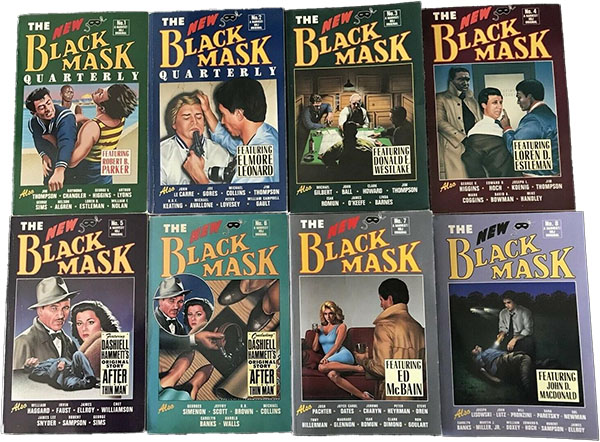
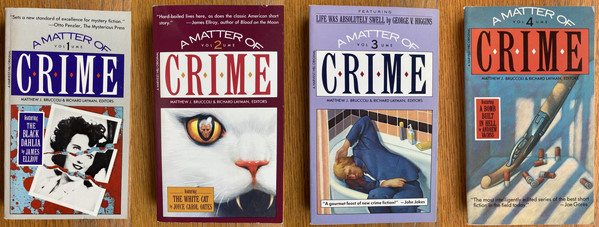
Next week: Recent memories
I love the work of Westlake, especially his Parker novels under his penname of Richrd Stark. I have read them all.
Barry, I too like Westlake’s work, though I prefer his Dortmunder series to his Parker novels. My mom also read all the Dortmunders and enjoyed them.
I bought all of these at a (then) big chain bookseller. I read each one cover to cover. Why a compromise could not be worked out with Keith is curious.
Bravo! I didn’t know anything about Jovanovich’s background and his involvement in the creation of the magazine. Very interesting.